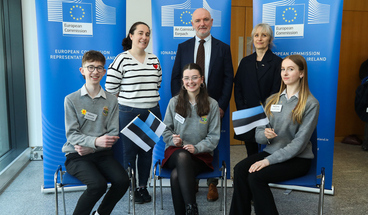EPAS schools' success at 2025 Model Council of the European Union Debate
The team from St Columba’s College, Stranorlar, Co. Donegal, a European Parliament Ambassador (EPAS) school, representing Estonia, have won this year’s Model Council of the EU debate for secondary school students.

The 2025 Model Council of the EU debate took place on Friday 28 March at Dublin Castle where 300 students and teachers from across Ireland gathered to take part and support their teams who passionately debated a mock EU law on ‘Protecting young people online in the EU’.
The Minister of State for European Affairs and Defence, Thomas Byrne T.D. gave the opening address and many of Ireland’s MEPs and EU Ambassadors and diplomats attended. MEP Lynn Boylan gave the closing speech and presented the prize to the winners.
The winning team from St Columba's College, Stranorlar, Co. Donegal are in the European Parliament Ambassador School (EPAS) programme and they and their classmates will now travel to Strasbourg in October to take part in Euroscola, where they will become MEPs for a day in the European Parliament.
Two EPAS schools were awarded joint second place:
- Drogheda Educate Together Secondary School representing Poland and
- Loreto Secondary School from Clonmel representing Slovenia.
Honourable mentions were given to the following schools:
- Manor House School, Raheny, Dublin (EPAS school) representing Italy,
- Our Lady's Secondary School, Castleblayney, Co. Monaghan representing Romania and
- Bailieborough Community School, Co. Cavan representing Czechia.
The Model Council of the EU debate mirrors the format of a real meeting of the Council of the European Union in Brussels. Teams composed of 3 students from secondary schools across Ireland play the role of Ministers from each of the 27 EU Member States.
This year, teams debated a mock EU law proposing new measures to protect young people online in the EU, including a proposal for an EU-wide ban on social media for under-16s, which provoked lively interventions and exchanges.
The Minister of State for European Affairs and Defence, Thomas Byrne T.D., said:
“The Model Council of the EU debate is a wonderful opportunity for students in Ireland to experience how the European democratic process works. It brings to life for students what a meeting of EU Ministers is like, something which can understandably seem far removed from our daily lives, and it shows how decisions taken together by Member States can have a positive impact on citizens. Most importantly, the Model Council gives young people the opportunity to have a seat at the table and make their voices heard. I want to commend the students who participated in the debate and thank the European Commission Representation in Ireland for their organisation of it”.
Member of the European Parliament for Dublin, Lynn Boylan, said:
“It is wonderful to see young people engage in the Model Council and experience the democratic process first hand. We are living in a period of great turmoil and upheaval, whereby international institutions are being undermined and many people feel disenfranchised. We need to invest in our young people and encourage critical thinking as they navigate their way through the era of disinformation."
The Head of the European Commission Representation in Ireland, Peter Power, said:
“The Model Council is the Commission’s annual flagship educational event in Ireland and brings together students from across the country to debate the major issues which will shape their future as European citizens. It encourages them to learn how the EU institutions work together to make new laws. These bright young people never fail to amaze us with their sharp minds, enthusiasm, and competitive spirit. They are our future leaders in the making”.
About EPAS
The European Parliament Ambassador School Programme (EPAS) aims at increasing students’ awareness of European parliamentary democracy, the role of the European Parliament and European values. It also encourages them to actively participate in EU democratic processes. It targets students with diverse educational, social and geographical backgrounds.
